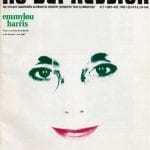Pinetop Seven – Toys in the attic
Pinetop Seven live across the street from the local crackhouse. Last year, one of the band members was outside talking to a friend when the house burst into flames. A freebasing incident gone horribly wrong, the band thinks. In Pinetop Seven’s neighborhood on the western edge of Chicago, automatic gunfire is not unheard of, sitting on the front stoop is considered an act of bravery, and, although guitarist Charles Kim almost got beat up the other day (“for absolutely no reason!”), band members figure they’ve gotten off easy so far.
Three people have been killed on their street, “and that’s just since we started this interview,” says Pinetop singer Darren Richard. “There’s something vibrant and sort of electric about the idea that we could be shot at any minute. Don’t you think?”
“When we first moved here, the neighbors thought Darren and I were narcotics agents,” says Kim. “But when they heard the music coming from upstairs, they realized we were just a band.”
Give or take a few touring members, Ryan and Kim, along with absent bassist Ryan Hembrey, form the bulk of Pinetop Seven, a band with a sound so lovely and so complicated they are loathe to try to describe it. (They ask instead: “Well, um…how would you describe it? Don’t you think that would be better?”) Consider Pinetop’s latest and most high-profile record, Rigging The Toplights, an art-country/jazz/avant-whatever outing set to a spaghetti western soundtrack. It fits within the elusive borders of alternative country just barely, if you stretch it a bit, which Pinetop actually wish you wouldn’t.
The band’s 1997 self-titled debut leaned a little more closely toward insurgent country than they ever have since (“One review for the first record said we were somewhere between Sun Ra and Son Volt,” remembers Kim, with a shudder), but the tag stuck, and still rankles, a little. Richard and Kim are happy for the attention but wary of the way the alt-country tag has had a tendency to turn similarly arty, hard-to-characterize bands such as fellow Chicagoans the Handsome Family into curiosity pieces.
“We don’t disavow our No Depression affinity, there’s just a lot of other stuff we listen to,” says Kim. “Right now we have a healthier balance than most people would expect.”
Comparisons have been made to Sixteen Horsepower and Palace, who share Pinetop Seven’s mournful, spindly air. “The more dissonant elements lurking on the first record we paid more attention to on the last two records,” says Kim, referring to Toplights and an EP titled No Breath In The Bellows, which was released earlier this year. “We sort of let all that come out more.”
The members of Pinetop say that everything from Bartok to Townes Van Zandt figures somewhere in the mix. The influence of soundtrack composers such as Rota and Komeda is particularly profound, and much of Toplights feels like the soundtrack to a Jim Jarmusch western. “I think it sounds cinematic because before we start arranging a song, we like to have a picture in our heads, some kind of unifying story,” says Kim. “That makes it easier to put together a cohesive song, when we know we’re all trying to paint the same picture.”
It’s hard to find a Pinetop Seven review that doesn’t include the words barren, paranoid or gloomy (and those are the good reviews), none of which they will necessarily disagree with. “Maybe the reason it’s perceived as dark is that the songs aren’t simple,” says Kim. “It’s not something you can pinpoint: ‘This is the point of the song.’ It leaves itself open to interpretation. Musically and lyrically it pulls you in, and that’s why people feel like it’s dark — because it starts reminding them of themselves.”
Famously insular, Pinetop Seven rarely play live and, a few sporadic dates aside, have never toured. Touring is always a tenuous proposition for a fledgling band, although in Pinetop’s case it might be safer than staying at home. Richard and Kim blame the delay on a desire to build a discography instead.
They are only now at the point, after three records, of confronting actual fans. “It was strange. We played South By Southwest, and we’d play the first couple bars of the first couple songs and people would applaud,” Richard marvels. “It was like we were Neil Diamond or something. Or Frank Sinatra; Frank sings the first line, and people recognize the song.”
Pinetop members will now have a rare chance to be out amongst the public. Kim and Richard try to appear pleased at the prospect. “It’s [meeting industry people] that I hate,” says Richard. “I hate bullshitting with people, I hate small talk….I think this industry sucks. It’s all about the bottom line. I’m happy to play shows, and it’s really great when someone comes up and tells you they really like your music. That means an awful lot to us, and it’s great. But as far as talking to these [industry] reps, it’s just a wank fest, and I don’t want any part of it.”




